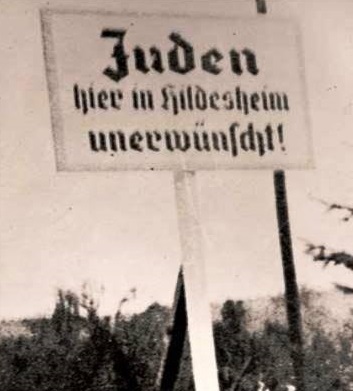A German university has cancelled a course on “The Social Situation of Young People in Palestine” that for the past decade has falsely presented Israel as a dehumanized society guilty of ethnic cleansing, genocide, torture, and stealing Palestinian organs.
For at least a year, the University of Applied Sciences and Arts (German acronym HAWK) in the Germany city of Hildesheim had refused to deal with criticism surrounding the course, insisting until recently that accusations of anti-Semitism were “unjustified and indefensible.”
According to a detailed op-ed by Die Welt columnist Alan Posener, the course was instituted in 2006 as a mandatory counterpart to a course on “Jewish Life in Germany and Israel,” which had been offered since 2000. From its inception in 2006, the new course was taught by Ibtissam Köhler; her qualifications are unclear, since the HAWK website has no publicly accessible information on her and requests for information from German media have been rejected by the university administration as a breach of Köhler’s privacy. However, Posener noted, the university did divulge that Köhler has “Palestinian roots” but “does not know” (i.e. presumably, has not visited) Israel or the Palestinian territories. Efforts by German media to interview Köhler have so far been unsuccessful.
The official syllabus of Köhler’s course listed sessions on “The Palestinian Catastrophe/The Ethnic Cleansing of Palestine;” “Intifada I and II,” focusing on Israel’s treatment of Palestinians while largely ignoring Palestinian terrorism; “The Israeli Apartheid Wall,” which was described as an “instrument of terror;” and a session depicting Israeli society as violent and dehumanized.
The university administration approved this syllabus, even though the instructor who taught the course on Jewish Life alerted the administration repeatedly that the mandatory counterpart to her course was problematic; there were apparently also complaints from students.
When the instructor who had taught the course on Jewish Life since 2000 retired a year ago, HAWK asked Dr. Rebecca Seidler, who has a psycho-social counseling practice and teaches at Hildesheim University, if she was interested in taking over. While Seidler intended to accept the offer at first, she was dismayed when she discovered what was taught in the mandatory counterpart course. In her view, the materials used in this course “were not scholarly, but appeared to be taken from Wikipedia, from conspiracy theory blogs and other non-scientific sources.”
After Seidler’s attempts to explain her concerns to the HAWK administration were at first left unanswered and then dismissed as a reflection of her “oversensitivity,” she brought the matter to the attention of the Central Council of Jews in Germany, which contacted the Lower Saxony education ministry, which oversees HAWK. When the ministry seemed reluctant to respond, the Central Council asked an anti-Semitism expert at the Amadeu Antonio Foundation, an anti-extremism NGO, to evaluate the course material.
The evaluation found that the course material barely addressed issues relevant to the purported subject matter of the course, and that most texts did not conform to even minimal academic standards, but were instead taken from far-Left and far-Right websites. Highlighting one text in particular, the expert reportedly noted that, except for material from neo-Nazi circles, he had hardly ever encountered a similar list of claims demonizing Israel.
The Central Council submitted the evaluation to the education ministry in Lower Saxony, which responded in January of this year by demanding an explanation from HAWK. However, according to Posener, it took the university’s ethics commission six months to eventually decide that it could not find “any indication that anti-Israel or anti-Semitic contents had been propagated in an inappropriate way.” Unsurprisingly, few German commentators who wrote about this story could resist the observation that the verdict of the HAWK ethics commission seemed to suggest that there were appropriate ways to propagate anti-Semitic material.
The case attracted wider attention after the Central Council published an account of it in its weekly newspaper Jüdische Allgemeine on July 21. A week later, Israeli Foreign Ministry spokesman Emmanuel Nahshon condemned the course as “an ugly and outrageous demonstration of Jew-hatred,” adding: “This is not a university, it is a hatred factory….One would think that in Germany of all places people would understand the pernicious nature of hatred and racism under a pseudo academic guise.”
However, when Nahshon’s condemnation was reported by German media, HAWK President Christiane Dienel vented her frustration on Twitter: “Anti-Semitism accusations against HAWK – Who is really the ‘hate factory’ here?” According to Posener’s column, Dienel had said earlier that she was “sad and hurt” that her university was presented in a “wrong light,” and had emphasized that she was a “true friend of Israel” and had even given her children “Jewish names.” In her view, the “completely baseless accusations of anti-Semitism” were intended to prevent the teaching of “different views” of the conflict between the Palestinians and Israel because some people were determined to ban inconvenient material. Some of these statements by Dienel were also included in an official announcement published on July 29, where she complained that the media coverage had led to a wave of accusations against her university that were best described as a “shitstorm” (though the English translation of her announcement delicately leaves this part out).
On August 1, Dienel tweeted in English:
#Antisemitism allegations against #HAWK totally unfounded – Independent expert commission https://t.co/dfqeAuR5jJ
— Christiane Dienel (@Dienel_HAWK) August 1, 2016
However, the texts (in German and English) that she linked to do not show—as her tweet suggests—that an independent expert commission concluded that the allegations against HAWK were “totally unfounded,” but merely that the Ministry of Science and Culture of Lower Saxony had decided to commission an independent expert to investigate the allegations.
The texts Dienel linked to also include an announcement stating that both the course Ibtissam Köhler had been teaching for a decade and the course Dr. Seidler had been asked to teach on Israel would be replaced by a “redesigned seminar on the topic ‘The Middle East conflict and social work’ in the coming winter semester 2016/2017.”
However, Posener noted, HAWK is now offering a course on “Israel and Palestine: Historical Background,” as well as an apparently related course taught by Lebanese-born lecturer Rabih El-Dick on “The PLO and Hamas: From National to Religious Resistance.” Again, it is not clear what qualifications El-Dick has; as far as I could find out, he seems to have a diploma or B.A., for which he wrote a thesis on “The Instrumentalization of Modern Media by Evangelicals in the USA” (2008); his supervisor was apparently HAWK lecturer Manfred Bolte. El-Dick has already taught at HAWK, offering an “Introduction to Islam – historical developments and contemporary positions.”
Posener argued at the end of his column that little good can be expected when Hamas is represented as “religious resistance.” As much as I respect Posener, I disagree. While it remains to be seen what El-Dick will actually teach (if anything will become public), in my experience only few people in Germany are aware of the contents of the Hamas Charter; indeed, as the distinguished American historian Jeffrey Herf has argued, this important document seems to be widely (and perhaps willfully) ignored. Most people are stunned to be confronted with quotes that illustrate the vile mixture of Islamic and European Jew-hatred that forms such a crucial part of Hamas’ ideology, which prominently includes a vision of an apocalyptic battle in which Muslims will slaughter the Jews.
So prima facie, I can see nothing wrong with a course that includes teaching about Hamas and its views of “religious resistance.” Likewise, I think it would be very useful if students in Hildesheim (and elsewhere) learned about the broad popular support for terrorism and the equally broad support for the idea that the world’s only Jewish state has no right to exist, which is reflected in Palestinian opinion surveys going back some two decades. Indeed, if one had to illustrate Palestinian “resistance”—whether national or religious—with just one picture, a historical photo from the Yad Vashem collections would be worth at least a thousand words.
Petra Marquardt-Bigman is a German-Israeli researcher and writer with a Ph.D. in contemporary history.
[Photo: Reise Reise / Wikimedia]





